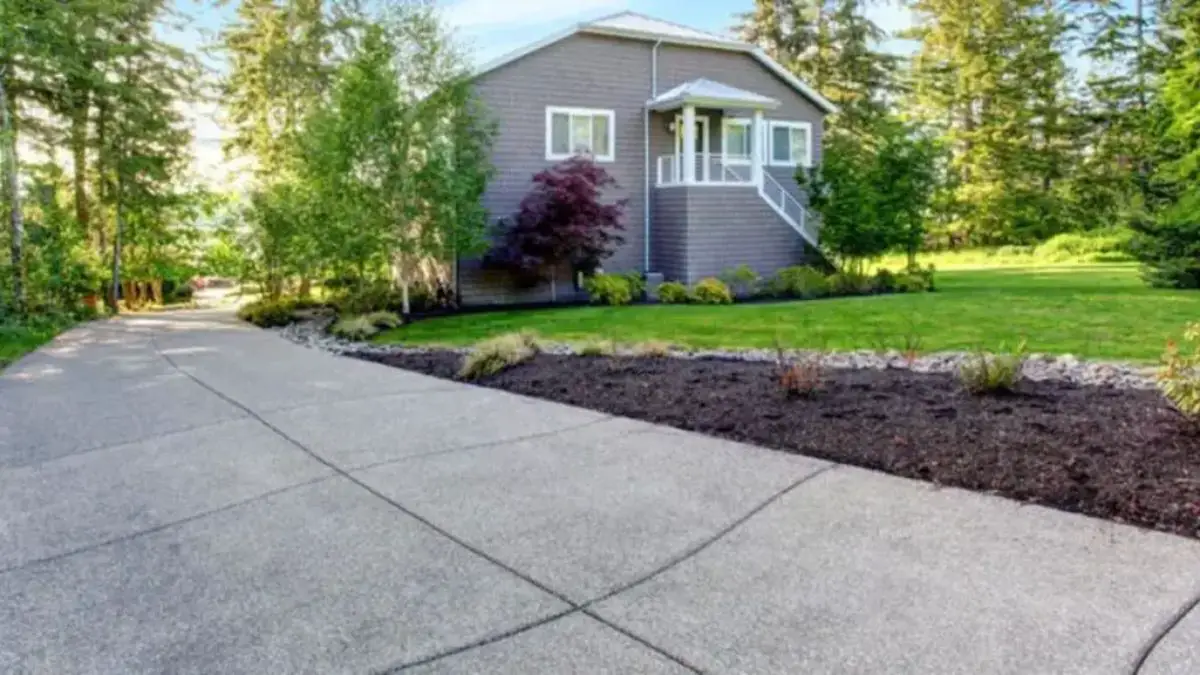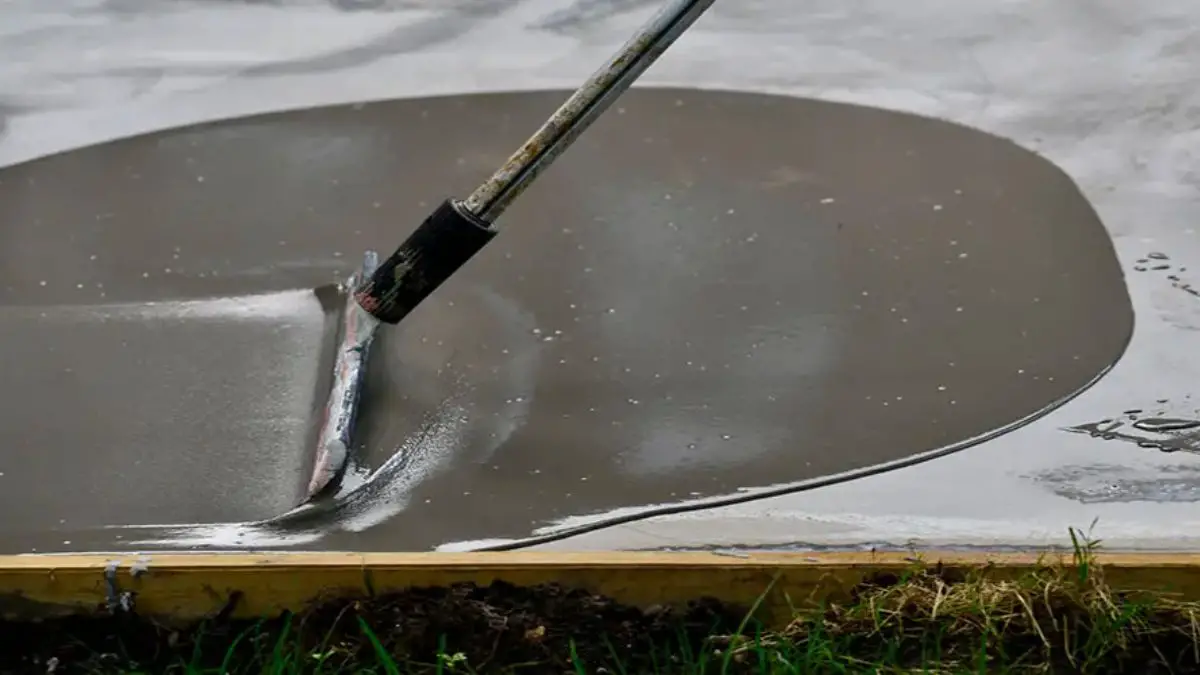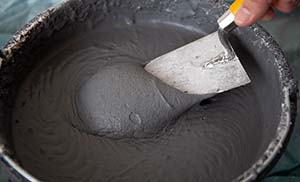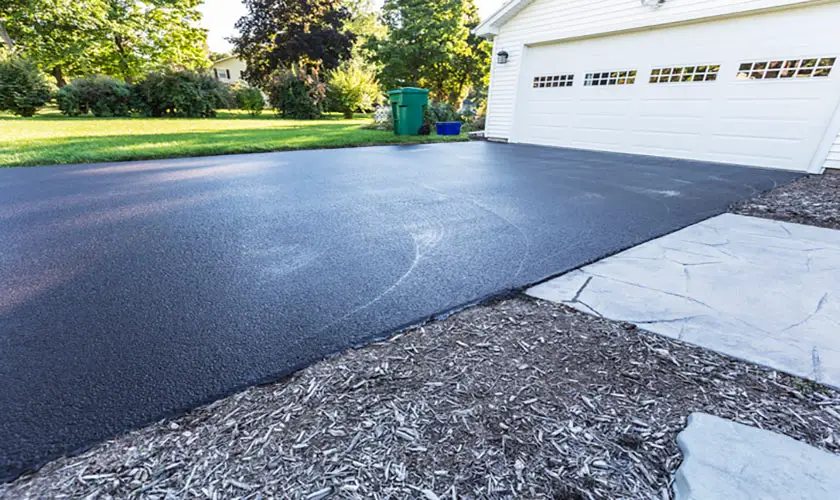
An asphalt driveway is an essential piece of many modern homes, and they are pretty expensive to replace, so it makes sense that you would want to make sure it lasts as long as possible.
There are many ways to maintain your residential driveway to help increase its lifespan, but sealing it is one of the simplest and most effective methods.
Applying sealer to an asphalt driveway every 2-3 years increases its lifespan by 20 years on average. Sealing asphalt surfaces will extend the life of your driveway by reducing wear and tear, making your driveway easier to clean, maintaining proper moisture levels in the asphalt, and preventing unwanted substances from permeating your driveway.
Many homeowners are now choosing asphalt or concrete driveways. There are pros and cons to both. We invite you to read our Concrete vs. Asphalt Driveway: Cost & Comparison Guide.
Many homeowners put off sealing their asphalt driveways, forget to do it, or don’t even know it is an option. As with most projects, there are pros and cons to consider when deciding if it is right for you. Below we’ll explore whether or not you should do it and some critical things about sealing a residential driveway that you should know.
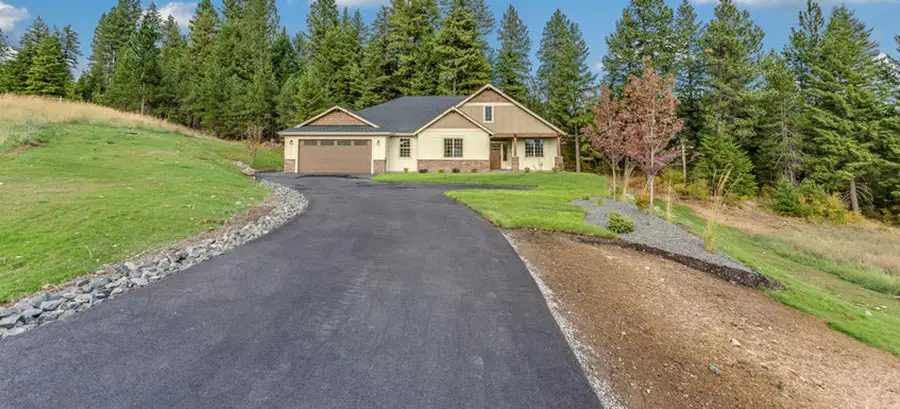
Is it Worth Sealing an Asphalt Driveway?
In the short-term, most asphalt driveways function perfectly fine without a sealant layer to protect them. Because sealing your blacktop is not highly urgent and imperative to the current function of your driveway, many people put it off and even question whether it is worth the effort and cost.
Over time natural elements, regular use, and other factors slowly break down your driveway. A good-quality acrylic sealers block UV rays and are weather-resistant to prevent permanent damage and increase your driveway’s life by decades.
An asphalt sealcoating applied to the driveway surface acts as a layer of protection for the asphalt underneath. It increases the driveway’s overall lifespan and can help prevent cracks, potholes, and other damage that would require expensive repairs. Sealing your asphalt driveway is by no means necessary, but in most cases, the benefits outweigh the disadvantages and costs.
Advantages
There are many advantages to sealing an asphalt driveway, but below are some of the most common and important ones to consider. By no means is sealing your driveway the perfect solution to extending its lifetime, but it is suitable in most cases.
- Protective Layer – Sealing your driveway adds a protective coating that can take on most regular wear and tear to reduce damage to the underlying asphalt. It also protects the asphalt from long-term UV radiation exposure that can expedite the deterioration process.
- Seals Imperfections – Over time, asphalt often develops small cracks and holes that can expand if not correctly treated. Asphalt sealer can help fill in minor imperfections in your driveway before they become a more significant issue.
- Stops Water Infiltration – Water expanding and contracting due to temperature can be a significant problem for asphalt driveways. Applying a layer of sealer over your blacktop surfaces helps block water penetration to regulate moisture levels and avoid costly damage.
- Increases Lifespan – All of the above advantages and many more contribute to increasing the lifespan of your asphalt driveway. Your driveway could last decades longer than intended with proper care and sealer application at the correct intervals.
- Curb Appeal – Blacktop driveways can maintain their fresh asphalt appearance for longer with a coat of sealer. Blacktop driveways fade from UV damage over time. An asphalt sealer can improve curb appeal by helping to keep the asphalt surface clean.
Disadvantages
A seal coating on your blacktop is not a fix-all solution for every driveway, as there are a few disadvantages. Most major drawbacks are easily avoidable or pale compared to the potential upside that sealing your asphalt driveway brings.
- Substantial Cost – A common objection and disadvantage to sealing an asphalt driveway is its cost. Many factors impact the price of sealing your driveway, and sometimes, it simply does not make financial sense.
- Surface Peeling – Uneven wear and tear on your blacktop can cause inconsistencies on the surface. The asphalt seal can appear to peel up in places, which can look unsightly and cause flakes of the material to get everywhere.
- Develops Hairline Cracks – Small cracks can form in the layer of sealer on your driveway, which looks unsightly and can increase moisture exposure. Generally, this is not an issue with proper sealer application at suitable intervals.
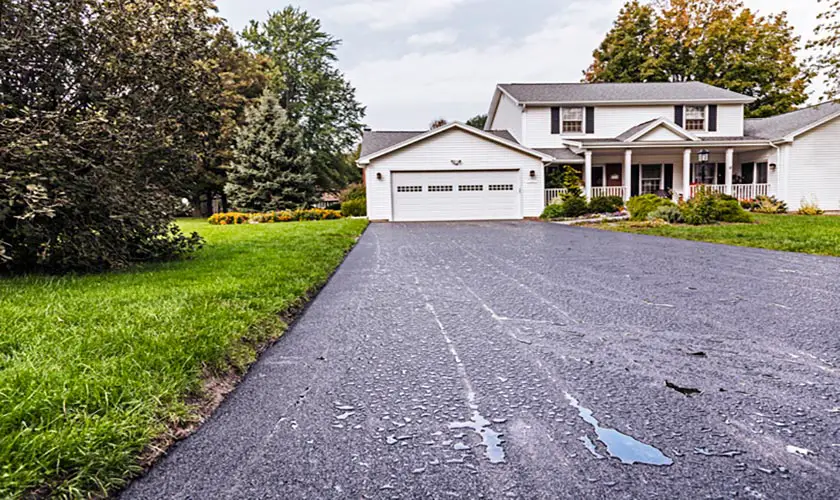
What You Need to Know When Sealing an Asphalt Driveway
Considering the above pros and cons, sealing most residential and commercial asphalt driveways makes sense. Increasing your driveway’s lifespan even by a few years can help save money in the long run by reducing expensive repairs and prolonging the time until you need to get your driveway resurfaced or replaced.
Many homeowners have tons of questions about sealing an asphalt driveway, so let’s discuss some of the most important things you should know about the process.
1. How Much Driveway Sealer You Need
One of the first things you must figure out is how much driveway sealer you need to cover your asphalt driveway completely. The exact amount you’ll need comes down to three main factors:
- The size of your asphalt driveway
- How many square feet a gallon of sealer covers
- The number of sealer coats you intend to apply
First, you must find the size of your driveway to help determine how much asphalt sealer you’ll need. You can estimate the exact size of your residential driveway by looking at the blueprints for your property or by measuring your blacktop and multiplying the width by the length of the entire driveway. The average two-car driveway for reference is 16×40 (640 square feet).
The number of square feet a gallon of sealer covers largely depends on the type and brand. It generally ranges from 100 to 250 square feet of coverage per gallon of sealer. Most sealer manufacturers recommend two coats with an eight-hour drying period between the two.
To calculate how many gallons of sealer you need for your asphalt driveway, divide your driveway’s square footage by how many square feet a gallon of sealer covers. Multiply that number by two to account for applying two coats.
2. The Best Driveway Sealer for Your Project
There are many types of driveway sealers to choose from, and it can be confusing which one is best for your situation and budget. Below are some of the best sealer types of asphalt sealers for asphalt driveways:
| Asphalt Sealer Types | VOC Emission Levels | Expected Lifespan |
| Coal Tar (not DIY) | High | 4 years |
| Asphalt-Based | Medium | 6 years |
| Acrylic-Based | Medium-Low | 7 years |
| Plain Surface | Medium-Low | 3 years |
| Fill-and-Seal | Medium-Low | 3 years |
- Coal tar sealers: These common sealers have been used on asphalt roads and driveways. They’re made from coal tar, a syrupy black liquid that cures to form a seal coat. It is not a DIY project since it requires industrial equipment that heats the tar to create a liquid that applies to asphalt surfaces.
- Asphalt-based sealers: An asphalt-based driveway sealer is used to repair and seal small cracks on worn asphalt surfaces. Asphalt-based sealers restore the worn surfaces and slow down the oxidation of asphalt materials. Unlike coal tar sealers, asphalt-based sealers can be applied by a driveway contractor or skilled DIYer.
- Acrylic-based sealers: Acrylic seal coating asphalt is a more expensive alternative. However, despite the expense, acrylic sealers have many advantages. It is durable, UV resistant, weather-resistant, and environmentally friendly. It’s the longest-lasting sealer lasting up to seven years before you need to reapply it, depending on traffic.
- Plain surface sealers: A plain surface asphalt driveway sealer is a thick black liquid generally applied with a heavy-duty paint roller, making it an easy DIY project. Plain sealers do not include sand, so they don’t fill holes or cracks. Plain sealers are perfect for new asphalt pavement. However, you’ll need to apply a crack filler and asphalt patching product for potholes on older asphalt driveways before sealing.
- Fill-and-seal products: These sealers include sand or sand-like components that are spread out to fill cracks up to ⅛-inch wide on the current driveway. The finished result is a textured, nonskid surface. Before laying a fill-and-seal product, you should repair potholes and cracks more than ¼ inch wide. Fill-and-seal asphalt surfacing treatments are DIY-friendly options.
Which type of driveway sealer you decide to go with is largely up to your preferences and needs. It is critical to consider your sealer’s Volatile Organic Compound (VOC) emission levels because breathing them in while the sealer dries can cause severe health risks.
If you have pets, children, or expect to be around the driveway while the sealer dries, look for low-VOC options.
Some rubber sealers offer a 10-year resurfacer and sealant together. The Jetcoat 10-year driveway sealer can fill cracks and seal in one resurfacing product. It’s best to apply a second coat after the first coat has dried and is smooth to touch within 24 hours. Coverage will vary from 250 to 350 square feet per bucket of driveway sealer.
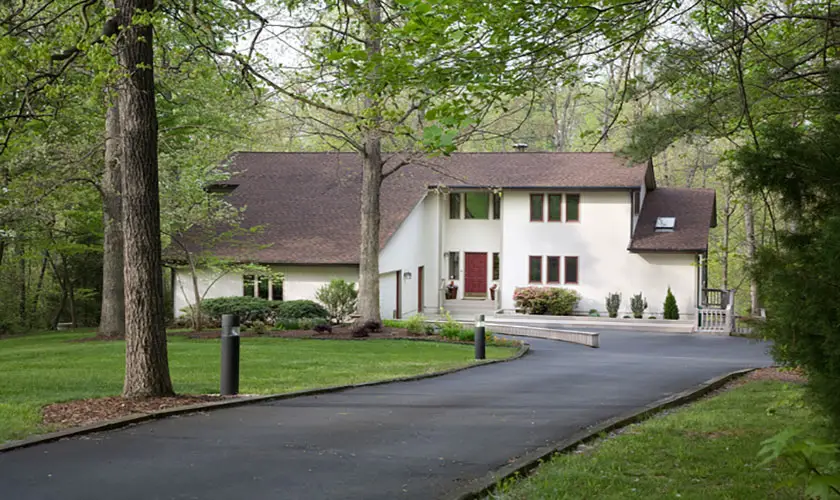
3. Asphalt Driveway Sealing Cost Breakdown
How much it’ll cost to seal an asphalt driveway is a significant consideration for most people. Generally, sealing your blacktop every few years will help reduce repairs and prolong the time until you need to replace your driveway completely, so it’s well worth it.
National averages suggest you’ll pay $0.15 and $0.65 per square foot for an asphalt driveway sealer, not including application supply or labor costs. Many factors can impact the average cost of asphalt driveway sealer, including the quality, type, brand, and quantity of sealer you buy.
If you’re not doing all the work yourself and hiring a company to apply the sealer, expect to pay roughly $1 to $1.25 per square foot for labor. You can save on labor expenses by sealing your driveway yourself, but in most cases, it’s better to pay the extra money to ensure it gets done right. Additionally, you’ll have to buy rollers and other supplies if you do it yourself, whereas companies often provide their own.
Adding up material and labor costs, expect to pay around $1.15 to $1.90 per square foot to seal your asphalt driveway. Since the average driveway is 640 square feet, that comes out to $736 to $1,216 total.
4. Wait Time Before Sealing Fresh Asphalt
If you just laid a brand new asphalt driveway or had your old one resurfaced, you probably want to know how long you must wait until you can safely apply a sealer coat. Generally, you should wait until the asphalt has completely dried and cured.
Asphalt driveways typically take 6-12 months to cure completely. Even though you can often walk and drive your car on asphalt after 72 hours, it’s still technically pliable and susceptible to damage if not carefully treated until fully cured. Temperature and weather can increase or decrease the curing time, but it’s best to wait at least six months before sealing a new driveway.

5. Best Time of the Year to Seal a Driveway
Generally, it’s best to apply a seal coat to an asphalt driveway during the spring or summer. There are many considerations as to when you should seal your driveway, but temperature and dry weather are some of the most important.
Most driveway sealers require temperatures above 50 degrees Fahrenheit for proper application. Sealing your driveway in warm weather months like spring or summer ensures the temperature stays above the minimum. It also gives the sealer plenty of time to fully cure before the winter when snow shovels and boots scrape it.
It’s also imperative to ensure it won’t rain while you’re sealing your driveway or afterward to give the sealer time to dry properly. Rainwater can wash away and ruin sealer that hasn’t dried yet. It’s best to have a weekend with warm and dry weather to allow the sealant time to dry.
6. Driveway Sealing Prep Work
A clean surface is a must for a successful sealcoating project. There’s already a lot to think about regarding preparation work before sealing your driveway, but it’s equally important to ensure the surface is ready for sealer. Preparation work before sealing an asphalt driveway can make a massive difference in creating an excellent finished look.
The first thing to do is ensure your driveway’s surface is free of potholes and larger cracks. Make any asphalt repairs necessary. Once that’s done, and any asphalt repairs or patches have cured, you must clean the entire surface of oil spills and gas stains. Use a degreaser to remove oil stains.
Using a broom or leaf blower, remove large sticks, rocks, and leaves from your driveway. Clean the driveway using a garden hose. If you have a power washer, thorough power washing is a good idea before sealing blacktop surfaces.
7. Best Driveway Sealant Application Method
For most residential driveways, it’s best to use a concrete squeegee to apply the sealer to the asphalt driveway. Pour some sealer at the top of the driveway and use the squeegee to quickly spread it out as you work your way towards the end.
If you’re using an asphalt sealer that is much more liquid, a large paint roller may work better than a squeegee. Application is very similar, but instead of pouring and spreading, you can pour the sealer into a paint pan and use the roller to apply it to the driveway.
8. Driveway Sealant Drying Time
Generally, asphalt driveway sealers require a drying time of at least 4 hours before they can withstand rainfall and 24 to 48 hours to cure completely. Every sealer has a specific drying time, so always follow that number over any other. It’s best to check the weather forecast before starting a sealing project.
If you’re applying multiple sealer coats on your driveway, you generally need to wait at least eight hours between coats. Many factors can influence asphalt sealer curing and drying time, including temperature, sun exposure, seal type, and coat thickness.

9. How Long Does Driveway Sealer Last?
It’s typically best to reapply asphalt sealer to driveways every three years. The exact intervals that you should reapply depend on the age of your driveway’s condition, age, and the type of sealer used. Newer driveways tend to require sealing less often than older driveways.
Over time the sealing coat wears down and exposes the asphalt underneath. Not only should you reapply asphalt sealer to your driveway for aesthetic purposes, but as the layer wears down, it loses some of its protective qualities. As a general rule, once you can see the color of the individual stones in the asphalt, it’s typically time to reseal your asphalt driveway.
How to Seal Your Asphalt Driveway
Frequently Asked Questions
Should an Asphalt Driveway be Sealed Every Year?
The best way to keep your asphalt driveway in good condition is to apply an asphalt sealer every 2 to 3 years. With proper application and a good-quality sealer, you shouldn’t need asphalt sealing every year. The best application involves applying two or more thin additional coats of sealant. With only one coat of sealant, you’ll likely need to apply an asphalt sealer every year.
What Happens if I Don’t Seal My Asphalt Driveway?
An asphalt sealer helps prevent water from penetrating the asphalt driveway. Too much water penetration can cause the gravel base underneath the asphalt to fail. If the gravel base fails, the asphalt will cause cracks and potholes to form.
How Many Square Feet Does a 5-Gallon Pail of Sealer Cover?
A typical 5-gallon bucket of sealer contains enough to cover 250 to 500 square feet. The thicker the sealer, the less square footage it will cover. A plain sealer can cover more asphalt and is applied in thin coats. The fill-and-seal products cover less surface area because it’s thicker and fills the cracks.
How Do You Know if Your Driveway Needs to be Sealed?
Asphalt surfaces should be sealed every 2 to 3 years. If you have an older asphalt driveway and have not sealed it in the past 3 years, it’s probably time to seal it. You need to get your driveway sealed if you see the oxidation (fading) from sunlight, rainwater absorbing into the asphalt, or your asphalt cracking.
Which is Better Brush-On or Spray-On Driveway Sealer?
You may either brush or spray the sealer on asphalt for plain sealers. There are pros and cons to both methods. Brushing on a sealer allows for a smooth surface finish, but it goes on thicker and can take longer to cure. Spraying on a sealant goes on thinner and has a faster cure time but requires multiple coats to achieve an even coating. Some asphalt driveway sealants are only brush-on applications and can’t be sprayed on because of their thickness.
Which is Better Oil-Based or Water-Based Driveway Sealer?
Water-based sealers are better because they have faster curing times and are environmentally friendly.
Oil-based sealers have a longer cure time and a strong odor that can last several days after the sealant is applied. Oil-based sealers also contain volatile organic compounds (VOCs), which pollute the environment.
What Happens if it Rains After Sealing Driveway?
Sealers need at least 4 hours before they can withstand rainfall and 24 to 48 hours to cure completely. Every sealer has a specific drying time, so follow the product instructions. If it rains too soon, it can wash the sealant away, resulting in streaking and uneven coverage.
How Long Do You Have to Stay Off a Driveway After Sealed?
It’s best to apply a sealant during the summer months of May through August when temperatures are above 50 degrees. We recommend avoiding driving cars on the driveway for 48 hours in the summer. In spring and autumn, wait 72 hours or more, depending on the temperature. The top layer of the driveway sealer will harden and dry, but it may still be wet underneath.
For heavy vehicles like RVs, it’s best to wait for 3 to 5 days before driving or parking on fresh sealant to allow the sealant to fully cure.
How Long Does it Take for Asphalt to Cure?
Asphalt driveways require roughly 6 to 12 months to cure fully. Even though you can walk and drive on asphalt after 72 hours, it’s still soft and prone to damage. The curing time can be accelerated or delayed by temperature and weather conditions, but it’s preferable to wait at least six months before sealing.
Do Driveway Sealers Need Two Coats?
Most driveway sealer manufacturers recommend two coats with 8 hours of drying time between coats. You should expect a driveway sealing job to take two days to complete.
Can You Mix Sand With Driveway Sealer?
Mixing sand with a driveway sealer provides a non-slip surface when dry. It can help fill small cracks to prevent water from seeping in the cracks and causing the driveway to crack or fail.
Can You Roll on Driveway Sealer?
If you are applying a water-based or an acrylic-based driveway sealer, it can be applied with a roller, although using a brush and squeegee is better. A roller can’t spread the sealer as well as a squeegee. You still may need a squeegee to even out roller lines with a roller. For products with solid content over 35 percent or using asphalt-based products, you must do so with a squeegee.
Can You Walk on a Freshly Sealed Driveway?
Asphalt sealer cures gradually, and it can bear increasingly heavier weights as it dries. It’s usually fine to walk on a freshly sealed driveway after 6 hours. Sealed asphalt requires at least 24 to 48 hours of dry time before you can drive on it.
Final Thoughts
When first approaching the idea of sealing your asphalt driveway, it can seem extremely complicated and expensive. However, that is far from the truth because it’s a relatively simple process that can significantly extend your driveway’s lifespan and save you money.
Simply sealing your driveway every three years can increase your driveway’s lifespan by 20 years on average. Driveways deteriorate over time, and without a protective asphalt sealcoating, they’re much more susceptible to sustaining costly damage and wear and tear from regular use.



